http://www.theyearbookladies.com/theyearbookblog/2009/05/07/how-to-pick-your-senior-quote/
http://sports.espn.go.com/espn/page2/story?page=simmons/021011
The following tips are from Bill Simmons, sports columnist, who posted them on ESPN.com. (Why is ESPN giving yearbook tips? Not sure, but I guess that just goes to show how important yearbooks are in our culture!)

Translation: I'm an enormous dork.
And it wasn't just me; almost everyone screws up their high school yearbook quote. It's like a rite of passage. My buddy Jim and I were on the phone this week sifting through our yearbook ... it was like a 100-page car crash. Why in God's name did everyone take it so seriously? Quote after agonized quote from The Police, Rush, Styx, Led Zep, Pink Floyd, Boston, Journey ... you would have thought we were these anguished, miserable, disaffected kids. Please. We were going to prep school! Maybe the only positive? Looking back, yearbooks are loaded with about as much unintentional comedy as you can pack in a hardcover book. The haircuts. The fashion styles. The quote choices. The dedications. You can't even believe what's happening as you're reading along. For instance, my old friend Adam used a Bananarama quote in our yearbook. Bananarama! You think that doesn't haunt him every day? Some tips about your yearbook choices: 1. If you can help it, avoid picking any quote from a band that might not be around in 10 years. If you want to cast your lot with Kid Rock, the White Stripes, Alicia Keys, India Arie, The Vines, The Hives or any of these other musical acts that people enjoy right now ... you're basically rolling the dice. Look at poor Adam. Bananarama. This actually happened. If it's a bubblegum act of the day, stay away. Stick with Bruce, the Stones, Pearl Jam, Nirvana and everyone else who will remain respectable 20 years from now. 2. If you feel like doing something wacky with your picture -- a nose piercing, a visible tattoo, a freaky hairdo -- don't do it. You will regret it. Remember, you'll be showing your kids this thing some day. 3. If they allow a section where you can write little comments, tributes and dedications, then ...

A. Never say anything maudlin or sentimental about the person you're dating -- you will be linked to them forever and ever. Just remember, when you get to college, you will break up with them by Columbus Day Weekend, probably get back together during Thanksgiving Break, then break up for good during Christmas vacation. Everyone thinks, "Oh, it won't happen to us." Believe me, it's going to happen -- 99 out of 100 people eventually break up with their high school flames. So keep the gooey stuff to minimum. If you're devoting a quote to your significant other, choose this one: "Dead man walking!"
B. Never gratuitously thank your parents, friends, family ... that's just lame. Nobody wants to read that stuff. If you want to thank someone, thank a teacher. They devoted their lives to helping kids like you, you ungrateful slob. C. Make a conscious effort to include obscure references and inside jokes that will confuse everybody and please your friends, especially if they're dirty and/or secretly defamatory to someone else in your class. One catch: Don't make them so obscure that you won't have any idea what they mean 15 years later. That's no fun. D. Don't identify your friends by their initials. Just write their names. Years later, you won't even remember what half the initials stood for. E. If you have a close friend of the opposite sex, don't spend too much time on them ... odds are, one of you will end up making a move on the other one down the road, it will play out badly, and you will never speak again. And even if you make it through college, once you get married, your spouse won't let you be friends with them anymore. So start cutting ties now. Again, just trust me. 4. Most importantly, have fun with your quote. Nobody wants to read how miserable you are, or how confused you are, or how much you hate everyone, or how everyone underestimated you, or how parents and teachers are purely and simply evil, or the world's keeping you down, or how nobody loves you ... come on! It's high school! Everyone's miserable in high school! That's why they created high school! So have some fun. I've always been jealous of my buddy Geoff for picking this yearbook quote:
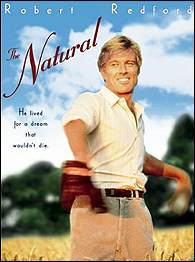
"Some mistakes you never stop paying for."
-- Roy Hobbs
"Don't have anything in your life that you can't walk away from in 30 seconds."
-- De Niro in "Heat" "Cheer up, Brando! How 'bout a mega-burger?"
-- Nat Busichio "I have three rules which I live by: Never get less than 12 hours sleep, never play cards with a guy who has the same first name as a city, and never go near a lady with a tattoo of a dagger on her hand. Now you stick with that, and everything else is cream cheese."
-- The basketball coach in "Teen Wolf" "Those fans who are booing me now will be cheering for me when I record the final out in the World Series"
-- Bob Stanley, April 1986
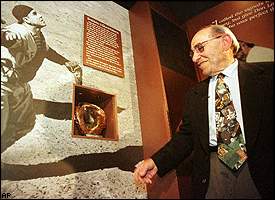
"Relax. We've been playing these guys for 80 years. They're never gonna beat us."
-- Yogi Berra to Bernie Williams during the 1999 ALCS
"Now it places the lotion in the basket ... now it places the lotion in the basket ... PUT THE (EXPLETIVE) LOTION IN THE BASKET!!!!! (Holding nipples) AHHHHH! AHHHHHHH!"
-- Buffalo Bill, a k a James Gumm "That's what they get for building a stadium on the ocean."
-- Oil Can Boyd, after a game was fogged out in Cleveland "Maybe the problems of two people don't amount to a hill of beans. But this is our hill. And these are our beans!"
-- Lt. Frank Drebin "Anything else is always something better."
-- Koglan the Bartender "Never tell tales about a woman -- she'll hear you no matter how far away she is."
-- Koglan the Bartender "Everything ends badly ... otherwise it wouldn't end."
-- Koglan the Bartender "Do you know how easy this is for me? Do you know how (expletive) easy this is? Do you have any (expletive) clue? It's a (expletive) joke. And I'm sorry you can't do this, I really am. I'm sorry I have to sit around and watch you fumble around and (expletive) it up."
-- Will Hunting "I've won at every level except high school and college."
-- Shaquille O'Neal "If she keeps putting you on hold, it's time to hang up the phone, pardner."
-- Larry King
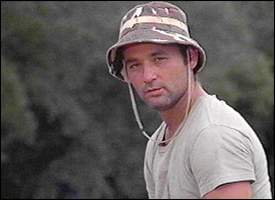
"And I said, 'Hey Lama, how 'bout a little something, you know, for the effort?' And he says, 'There won't be any money, but when you die, on your deathbed you will receive total consciousness.' So I got that going for me ... which is nice."
-- Carl Spackler
"They forgot about one thing ... they forgot about Larry Bird."
-- Danny Ainge "This is A.C.! I got O.J. in the car! (pause) This is A.C.! You know who this is, ---dammit!"
-- Al Cowlings "Anytime someone calls you and identifies themselves with their full name, odds are it isn't someone you want to talk to under any circumstances."
-- Bill Simmons "A sportswriter looks up in the sky and then asks you, 'Is the sun shining?' "
-- Sonny Liston "Drew Bledsoe's obviously having trouble with that prosthetic device on his finger."
-- Beasley Reece "You don't own your possessions, your possessions own you."
-- Tyler Dirden
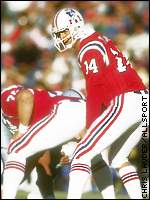
"You've gotta deal with those types of things or you're not gonna be around this league too long."
-- Steve Grogan
"I want you to watch something now ... watch this!"
-- Paul Maguire "Children are like TV sets. When they start acting weird, whack them across the head with a big rubber basketball shoe."
-- Hunter S. Thompson "Being a professional means doing your job on the days you don't feel like doing it."
-- David Halberstam "I like simple pleasures, like butter in my (expletive), lollipops in my mouth. That's just me. That's just something that I enjoy."
-- Floyd Gandolli "Well, that kind of puts a damper on even a Yankees win."
-- Phil Rizzuto after hearing about Pope Paul VI's death "I can't get over the size of this Russian!"
-- Warner Wolf "I have two things in this world -- my word and my balls -- and I don't break neither one of them for nobody."
-- Tony Montana "What happened? How did everything that was so good get so bad?"
-- Rocky Balboa
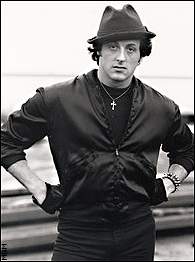
"If I can change ... and you can change ... Everyone can change!"
-- Rocky Balboa
"Uh-ha, it's all good baby bay-bee, uh."
-- Notorious B.I.G. "I think Corey had the talent to win an Academy Award some day."
-- Corey Haim's father "Listen, here's the thing. If you can't spot the sucker in your first half hour at the table, then you are the sucker."
-- Mike McDermott "In the poker game of life, women are the rake. They are the (expletive) rake."
-- Lester "Worm" Murphy "Talk is cheap and rumors are even cheaper."
-- Carver High coach Ken Reeves
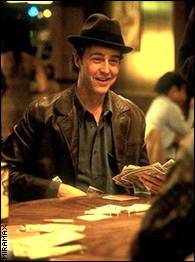
"His recollection was not in a full and adequate disclosure, and not in conformity with an objective reality."
-- Edward Bennett Williams on George Steinbrenner
"The amount of liquor I drank last night would have killed a small- to medium-sized Asian family."
-- The Dorfman, H.C. class of '92 "I don't understand the creative process. Actually, I make a concerted effort not to understand it. I don't know what it is or how it works but I am terrified that one green morning it will decide not to work anymore, so I have always given it as wide a bypass as possible."
-- William Goldman "You want a beer? Wanna quit starin' at mine then?"
-- Dylan McKay "On this Father's Day, we'd like to wish all you fathers out here a happy birthday."
-- Ralph Kiner, Father Day 1988 "Please, Hatch. You must play. If we run now, we lose much more than a game."
-- Pele "Great players make great plays."
-- Joe Theismann "Never rat on your friends and always keep your mouth shut."
-- Jimmy Conway "Just when they think they got all the answers, I change the questions."
-- Roddy Piper "After changes upon changes we are more or less the same ... after changes, we are more or less the same."
-- Paul Simon "It seems like I win every week ... and I do!"
-- Stu Feiner "Being a Red Sox fan is like being a 120-pound man in a maximum security prison."
-- My buddy Nez "Is this a futuristic movie?"
-- My buddy Nez 30 minutes into "Escape from New York"
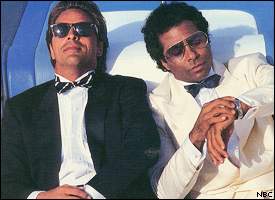
"Well, our divorce was a bigger failure than our marriage."
-- Sonny Crockett to his estranged wife
"Yah mo be there."
-- Michael McDonald to James Ingram "They can do whatever they want. I'll still be eating steak every night."
-- Von Hayes on Philly fans booing him "Last time I checked, there weren't any W's and L's in my paycheck."
-- Former Celtic Curtis Rowe "Show me a good and gracious loser, and I'll show you a failure."
-- Knute Rockne "We weren't giving up on Chauncey! We thought he was fantastic!"
-- Rick Pitino, after trading No. 1 pick Chauncey Billups after 50 games
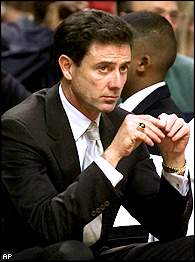
"Larry Bird is not walking through that door, fans. Kevin McHale is not walking through that door, and Robert Parish is not walking through that door. And if you expect them to walk through that door, they're going to be gray and old. ... And as soon as they realize that those three guys are not coming through the door, the better this town will be for all of us. ... All this negativity that's in this town sucks."
-- Rick Pitino
"Wish I didn't know now what I didn't now then."
-- Bob Seger "The only time I want to talk to a woman when I'm naked is if I'm on top of her or she's on top of me."
-- Former Tigers pitcher Jack Morris on female sportswriters "When I was in elementary school, we had the kid who threw chairs, the kid who stuttered, and the kid who went to the bathroom on himself ... but we never had the kid who came in one day and started shooting everyone."
-- Bill Simmons "Fat, drunk and stupid is no way to go through life, son."
-- Dean Wormer "You don't pick up a woman who just put staples in your side!" -- My buddy Nick while watching "Road House" "If anything in life is certain, if history has taught us anything ... it's that you can kill anyone."
-- Michael Corleone "Stop looking out, start looking in. Be your own best friend. Stand up and say, hey, this is mine!"
-- Sammy Hagar "No one has ever satisfied me like Christopher Burk."
-- (insert name of homecoming queen here) Hope that helped. And best of luck to all the high school seniors out there, including young Christopher Burk. Bill Simmons is a columnist for Page 2 and ESPN The Magazine.
http://sports.espn.go.com/espn/page2/story?page=simmons/021011
The following tips are from Bill Simmons, sports columnist, who posted them on ESPN.com. (Why is ESPN giving yearbook tips? Not sure, but I guess that just goes to show how important yearbooks are in our culture!)
“Some tips about your yearbook choices:
- If you can help it, avoid picking any quote from a band that might not be around in 10 years. If you want to cast your lot with Kid Rock, the White Stripes, Alicia Keys, India Arie, The Vines, The Hives or any of these other musical acts that people enjoy right now … you’re basically rolling the dice. Look at poor Adam. Bananarama. This actually happened. If it’s a bubblegum act of the day, stay away. Stick with Bruce, the Stones, Pearl Jam, Nirvana and everyone else who will remain respectable 20 years from now.
- If you feel like doing something wacky with your picture — a nose piercing, a visible tattoo, a freaky hairdo — don’t do it. You will regret it. Remember, you’ll be showing your kids this thing some day.
- If they allow a section where you can write little comments, tributes and dedications, then …
- Never say anything maudlin or sentimental about the person you’re dating — you will be linked to them forever and ever. Just remember, when you get to college, you will break up with them by Columbus Day Weekend, probably get back together during Thanksgiving Break, then break up for good during Christmas vacation. Everyone thinks, “Oh, it won’t happen to us.” Believe me, it’s going to happen — 99 out of 100 people eventually break up with their high school flames. So keep the gooey stuff to minimum. If you’re devoting a quote to your significant other, choose this one: “Dead man walking!”
- Never gratuitously thank your parents, friends, family … that’s just lame. Nobody wants to read that stuff. If you want to thank someone, thank a teacher. They devoted their lives to helping kids like you, you ungrateful slob.
- Make a conscious effort to include obscure references and inside jokes that will confuse everybody and please your friends, especially if they’re dirty and/or secretly defamatory to someone else in your class. One catch: Don’t make them so obscure that you won’t have any idea what they mean 15 years later. That’s no fun.
- Don’t identify your friends by their initials. Just write their names. Years later, you won’t even remember what half the initials stood for.
- If you have a close friend of the opposite sex, don’t spend too much time on them … odds are, one of you will end up making a move on the other one down the road, it will play out badly, and you will never speak again. And even if you make it through college, once you get married, your spouse won’t let you be friends with them anymore. So start cutting ties now. Again, just trust me.
- Most importantly, have fun with your quote. Nobody wants to read how miserable you are, or how confused you are, or how much you hate everyone, or how everyone underestimated you, or how parents and teachers are purely and simply evil, or the world’s keeping you down, or how nobody loves you … come on! It’s high school! Everyone’s miserable in high school! That’s why they created high school! So have some fun. I’ve always been jealous of my buddy Geoff for picking this yearbook quote:
- “ .” – Mark Bavaro
Absolutely brilliant. Everyone else was killing themselves coming up with these tortured quotes, and Geoff mocked the entire thing. Why didn’t I think of that? Damn him…”
Simmons then lists several quotes he wishes he would have used back in high school. Here are just a few…“Some mistakes you never stop paying for.”
– Roy Hobbs
– Roy Hobbs
“Don’t have anything in your life that you can’t walk away from in 30 seconds.”
– De Niro in “Heat”
– De Niro in “Heat”
“Cheer up, Brando! How ’bout a mega-burger?”
– Nat Busichio
– Nat Busichio
“I have three rules which I live by: Never get less than 12 hours sleep, never play cards with a guy who has the same first name as a city, and never go near a lady with a tattoo of a dagger on her hand. Now you stick with that, and everything else is cream cheese.”
– The basketball coach in “Teen Wolf”
– The basketball coach in “Teen Wolf”
“Those fans who are booing me now will be cheering for me when I record the final out in the World Series”
– Bob Stanley, April 1986
– Bob Stanley, April 1986
http://sports.espn.go.com/espn/page2/story?page=simmons/021011
- Q: I am a senior in high school, and it is about time to write our Senior Quotes. I really want mine to be funny. Any suggestions? -- Christopher Burk, Bellport, N.Y.
- And these children that you spit on As they try to change their worlds Are immune to your consultations They're quite aware of what they're going through -- David Bowie

David Bowie is still going strong, but The Sports Guy would like to make some "Changes" to his yearbook quote.
And it wasn't just me; almost everyone screws up their high school yearbook quote. It's like a rite of passage. My buddy Jim and I were on the phone this week sifting through our yearbook ... it was like a 100-page car crash. Why in God's name did everyone take it so seriously? Quote after agonized quote from The Police, Rush, Styx, Led Zep, Pink Floyd, Boston, Journey ... you would have thought we were these anguished, miserable, disaffected kids. Please. We were going to prep school! Maybe the only positive? Looking back, yearbooks are loaded with about as much unintentional comedy as you can pack in a hardcover book. The haircuts. The fashion styles. The quote choices. The dedications. You can't even believe what's happening as you're reading along. For instance, my old friend Adam used a Bananarama quote in our yearbook. Bananarama! You think that doesn't haunt him every day? Some tips about your yearbook choices: 1. If you can help it, avoid picking any quote from a band that might not be around in 10 years. If you want to cast your lot with Kid Rock, the White Stripes, Alicia Keys, India Arie, The Vines, The Hives or any of these other musical acts that people enjoy right now ... you're basically rolling the dice. Look at poor Adam. Bananarama. This actually happened. If it's a bubblegum act of the day, stay away. Stick with Bruce, the Stones, Pearl Jam, Nirvana and everyone else who will remain respectable 20 years from now. 2. If you feel like doing something wacky with your picture -- a nose piercing, a visible tattoo, a freaky hairdo -- don't do it. You will regret it. Remember, you'll be showing your kids this thing some day. 3. If they allow a section where you can write little comments, tributes and dedications, then ...

Quoting a group like Bananarama can haunt a kid into adulthood.
B. Never gratuitously thank your parents, friends, family ... that's just lame. Nobody wants to read that stuff. If you want to thank someone, thank a teacher. They devoted their lives to helping kids like you, you ungrateful slob. C. Make a conscious effort to include obscure references and inside jokes that will confuse everybody and please your friends, especially if they're dirty and/or secretly defamatory to someone else in your class. One catch: Don't make them so obscure that you won't have any idea what they mean 15 years later. That's no fun. D. Don't identify your friends by their initials. Just write their names. Years later, you won't even remember what half the initials stood for. E. If you have a close friend of the opposite sex, don't spend too much time on them ... odds are, one of you will end up making a move on the other one down the road, it will play out badly, and you will never speak again. And even if you make it through college, once you get married, your spouse won't let you be friends with them anymore. So start cutting ties now. Again, just trust me. 4. Most importantly, have fun with your quote. Nobody wants to read how miserable you are, or how confused you are, or how much you hate everyone, or how everyone underestimated you, or how parents and teachers are purely and simply evil, or the world's keeping you down, or how nobody loves you ... come on! It's high school! Everyone's miserable in high school! That's why they created high school! So have some fun. I've always been jealous of my buddy Geoff for picking this yearbook quote:
- " ." -- Mark Bavaro

Roy Hobbs offered some words to live by.
-- Roy Hobbs
"Don't have anything in your life that you can't walk away from in 30 seconds."
-- De Niro in "Heat" "Cheer up, Brando! How 'bout a mega-burger?"
-- Nat Busichio "I have three rules which I live by: Never get less than 12 hours sleep, never play cards with a guy who has the same first name as a city, and never go near a lady with a tattoo of a dagger on her hand. Now you stick with that, and everything else is cream cheese."
-- The basketball coach in "Teen Wolf" "Those fans who are booing me now will be cheering for me when I record the final out in the World Series"
-- Bob Stanley, April 1986

Even in Boston, Yankees legend Yogi Berra is worth quoting.
-- Yogi Berra to Bernie Williams during the 1999 ALCS
"Now it places the lotion in the basket ... now it places the lotion in the basket ... PUT THE (EXPLETIVE) LOTION IN THE BASKET!!!!! (Holding nipples) AHHHHH! AHHHHHHH!"
-- Buffalo Bill, a k a James Gumm "That's what they get for building a stadium on the ocean."
-- Oil Can Boyd, after a game was fogged out in Cleveland "Maybe the problems of two people don't amount to a hill of beans. But this is our hill. And these are our beans!"
-- Lt. Frank Drebin "Anything else is always something better."
-- Koglan the Bartender "Never tell tales about a woman -- she'll hear you no matter how far away she is."
-- Koglan the Bartender "Everything ends badly ... otherwise it wouldn't end."
-- Koglan the Bartender "Do you know how easy this is for me? Do you know how (expletive) easy this is? Do you have any (expletive) clue? It's a (expletive) joke. And I'm sorry you can't do this, I really am. I'm sorry I have to sit around and watch you fumble around and (expletive) it up."
-- Will Hunting "I've won at every level except high school and college."
-- Shaquille O'Neal "If she keeps putting you on hold, it's time to hang up the phone, pardner."
-- Larry King

Carl Spackler will help you turn your yearbook into a real "Cinderella Story."
-- Carl Spackler
"They forgot about one thing ... they forgot about Larry Bird."
-- Danny Ainge "This is A.C.! I got O.J. in the car! (pause) This is A.C.! You know who this is, ---dammit!"
-- Al Cowlings "Anytime someone calls you and identifies themselves with their full name, odds are it isn't someone you want to talk to under any circumstances."
-- Bill Simmons "A sportswriter looks up in the sky and then asks you, 'Is the sun shining?' "
-- Sonny Liston "Drew Bledsoe's obviously having trouble with that prosthetic device on his finger."
-- Beasley Reece "You don't own your possessions, your possessions own you."
-- Tyler Dirden

"You've gotta learn to deal with those things" or you'll end up like Steve Grogan.
-- Steve Grogan
"I want you to watch something now ... watch this!"
-- Paul Maguire "Children are like TV sets. When they start acting weird, whack them across the head with a big rubber basketball shoe."
-- Hunter S. Thompson "Being a professional means doing your job on the days you don't feel like doing it."
-- David Halberstam "I like simple pleasures, like butter in my (expletive), lollipops in my mouth. That's just me. That's just something that I enjoy."
-- Floyd Gandolli "Well, that kind of puts a damper on even a Yankees win."
-- Phil Rizzuto after hearing about Pope Paul VI's death "I can't get over the size of this Russian!"
-- Warner Wolf "I have two things in this world -- my word and my balls -- and I don't break neither one of them for nobody."
-- Tony Montana "What happened? How did everything that was so good get so bad?"
-- Rocky Balboa

AP
Let Rocky Balboa help you ease through the "change" of leaving high school.
-- Rocky Balboa
"Uh-ha, it's all good baby bay-bee, uh."
-- Notorious B.I.G. "I think Corey had the talent to win an Academy Award some day."
-- Corey Haim's father "Listen, here's the thing. If you can't spot the sucker in your first half hour at the table, then you are the sucker."
-- Mike McDermott "In the poker game of life, women are the rake. They are the (expletive) rake."
-- Lester "Worm" Murphy "Talk is cheap and rumors are even cheaper."
-- Carver High coach Ken Reeves

Worm Murphy talked a better game than he played in "Rounders."
-- Edward Bennett Williams on George Steinbrenner
"The amount of liquor I drank last night would have killed a small- to medium-sized Asian family."
-- The Dorfman, H.C. class of '92 "I don't understand the creative process. Actually, I make a concerted effort not to understand it. I don't know what it is or how it works but I am terrified that one green morning it will decide not to work anymore, so I have always given it as wide a bypass as possible."
-- William Goldman "You want a beer? Wanna quit starin' at mine then?"
-- Dylan McKay "On this Father's Day, we'd like to wish all you fathers out here a happy birthday."
-- Ralph Kiner, Father Day 1988 "Please, Hatch. You must play. If we run now, we lose much more than a game."
-- Pele "Great players make great plays."
-- Joe Theismann "Never rat on your friends and always keep your mouth shut."
-- Jimmy Conway "Just when they think they got all the answers, I change the questions."
-- Roddy Piper "After changes upon changes we are more or less the same ... after changes, we are more or less the same."
-- Paul Simon "It seems like I win every week ... and I do!"
-- Stu Feiner "Being a Red Sox fan is like being a 120-pound man in a maximum security prison."
-- My buddy Nez "Is this a futuristic movie?"
-- My buddy Nez 30 minutes into "Escape from New York"

Quoting Sonny Crockett, left, should go over big with the ladies.
-- Sonny Crockett to his estranged wife
"Yah mo be there."
-- Michael McDonald to James Ingram "They can do whatever they want. I'll still be eating steak every night."
-- Von Hayes on Philly fans booing him "Last time I checked, there weren't any W's and L's in my paycheck."
-- Former Celtic Curtis Rowe "Show me a good and gracious loser, and I'll show you a failure."
-- Knute Rockne "We weren't giving up on Chauncey! We thought he was fantastic!"
-- Rick Pitino, after trading No. 1 pick Chauncey Billups after 50 games

What Sports Guy column would be complete without a few words from Rick Pitino?
-- Rick Pitino
"Wish I didn't know now what I didn't now then."
-- Bob Seger "The only time I want to talk to a woman when I'm naked is if I'm on top of her or she's on top of me."
-- Former Tigers pitcher Jack Morris on female sportswriters "When I was in elementary school, we had the kid who threw chairs, the kid who stuttered, and the kid who went to the bathroom on himself ... but we never had the kid who came in one day and started shooting everyone."
-- Bill Simmons "Fat, drunk and stupid is no way to go through life, son."
-- Dean Wormer "You don't pick up a woman who just put staples in your side!" -- My buddy Nick while watching "Road House" "If anything in life is certain, if history has taught us anything ... it's that you can kill anyone."
-- Michael Corleone "Stop looking out, start looking in. Be your own best friend. Stand up and say, hey, this is mine!"
-- Sammy Hagar "No one has ever satisfied me like Christopher Burk."
-- (insert name of homecoming queen here) Hope that helped. And best of luck to all the high school seniors out there, including young Christopher Burk. Bill Simmons is a columnist for Page 2 and ESPN The Magazine.












